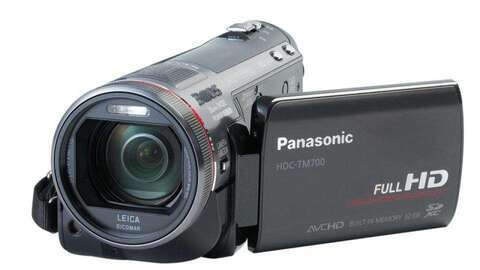Panasonic HDC-TM700 review
Proper HD camcorders, as opposed to mini camcorders like Flip's Ultra HD , had a tough time last year. They were seriously threatened by the inclusion of HD video modes in many digital cameras, plus the poor exchange rate between the pound and the Japanese yen hit major manufacturers such as Canon, Sony and Panasonic. Prices rose rather than fell, and older models were actually a better deal. Thankfully, things have settled somewhat, and the latest models, like this HDC-TM700 are once again piquing our interest.
The TM700 has a lot of similarities to last year's HDC-TM300. Its actual dimensions have shrunk by a few millimetres on each side, though this is down to a redesign that removes some extruding parts, and on the whole it feels a little chunkier. It's certainly fatter at the front, thanks to a larger, upgraded lens.
The new lens has an impressive wide angle (for a camcorder), with a 35mm SLR equivalent, down from 45mm on the previous model. This makes a big difference, both when shooting landscapes or indoors when you need to fit everyone in the shot. At the wide end of the zoom it has an improved F1.5 aperture, up from F1.8 in the previous model. The telephoto end remains the same though, with a 12x optical zoom (540mm equivalent) at F2.8.
Despite its compact dimensions, and consumer-friendly styling, the TM700 has a wealth of manual controls for those who like to get more involved. A button by the control ring brings up a quick-select menu on touchscreen display with focus, white balance, shutter speed and aperture control. Turning the ring then lets you adjust these precisely to your needs. Manual focus is assisted by bright blue fringing on areas that are in focus, making it easy to get your subject sharp. The aperture control, labelled Iris, lets you set traditional F-stops but when the aperture is fully open it then switches directly to boosting the sensitivity of the sensors – here you get a small histogram for helping you set the right exposure.
Little has changed since last year's model on the inside. Panasonic continues to use an array of three 1/4.1in CMOS sensors to brilliant effect. Colours in automatic mode remain a little oversaturated and are punchier than reality, but most people seem to like their video this way and it's not overdone. Detail is stunning Noise levels in low light situations are also impressive, possibly the best we've seen from any camcorder, and colour holds up well in such challenging conditions too.
A big new feature is its ability to record HD footage at a full 50 frames per second. This mode should provide the best possible video quality, with a resulting video file that exceeds the bitrate of many Blu-ray movies. At 28Mbit/s it's a monstrous amount of video to store, around 12.5GB an hour, and editing it will bring practically any PC to its knees. To be honest though, we found it hard to tell the difference between this and the 17Mbit/s interlaced 1080p mode, and we think the latter will better suit most users.
Audio is provided by a 5.1 surround sound microphone on the top of the camcorder, which adds a feeling of immersion to casual shoots. Headphone and microphone sockets are tucked away beneath one flap, while another flap hides an unusual metal slot. There's no space on the camcorder for a traditional accessory shoe, instead you slide the provided adaptor into the slot, which then gives you a standard unpowered shoe. This sits alongside and level with the built-in microphone, very handy and very neat.
